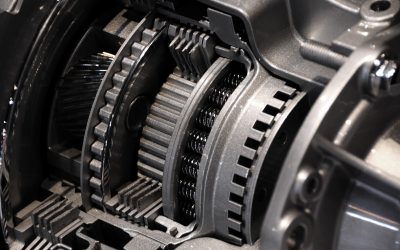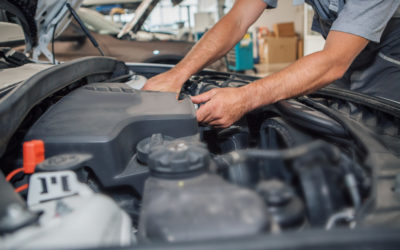What are some common transmission problems?
There’s a pretty high chance that if you are a car owner, the phrase “Transmission problems” has made your heart sink. These problems can often be incredibly stressful and expensive to deal with and can often push car owners to just get a new vehicle instead of trying to deal with transmission issues. These problems can be scary, but here we’ll tell you how to catch these problems early or to prevent them all together.
Related: AAMCO Transmission Services
Prevent Transmission Issues from Getting Worse
Bring your vehicle in to AAMCO Louisville today!
We can get your vehicle’s transmission issues sorted before they become an expensive problem. Learn More »
What parts make up a transmission?
It’s important to know what actually goes into a transmission before you start thinking about what problems can affect each component. Transmissions have literally hundreds of precisely placed pieces that compose the device. These pieces are grouped together into a few key systems that make the transmission function.
Bell Housing: When you look under your hood, this cone shaped metal case houses the flywheel and the clutch or torque converter. The location of the bell housing is determined by your vehicle’s drive mode, front or rear-wheel drive.
Gears: Even if you aren’t shifting them, an automatic transmission had gears too. They are split into main gears and planetary gears. The gears come in different sizes and with varying amounts of teeth, allowing the transmission to adjust the amount of power (torque) being sent to the drive-wheel.
Fluid: Transmission fluid functions as both a lubricant, like engine oil, and a hydraulic fluid that assists with gear shifts, cooling the transmission and lubricating all the moving parts. Old or dirty transmission fluid can be a common cause of transmission issues.
Filter: The transmission fluid filter helps to keep the fluid clean to avoid issues with dirty and old transmission issues. The filter needs to catch any dirt and debris to keep your vehicle running efficiently and safely.
Now that you’ve learned about some of the more important symptoms in your transmission, we can start looking at what might be breaking in your vehicle’s transmission.
Commonly Reported Transmission Issues
Little of No Response
Have you ever noticed that your vehicle struggles, hesitates, or refuses to shift into gear? This is a definite sign of a transmission problem. As soon as you shift your car from drive, it should immediately go into the desired gear. When it comes to automatic transmissions, if you notice that when shifting into drive or park there is a delay before feeling the gear engage, this is a transmission-based concern. Manual transmissions may have some lacking response issues, but once you shift into gear, the engine’s RPMs will surge. The car won’t actually move as fast as the engine may sound like it is. This is typically caused by a faulty clutch that requires replacement, but could indicate more severe problems.
Leaking or Low Fluid
The good thing about a leaky transmission is that it’s comparatively simple to discover due to it being seen often by mechanics and non-mechanics alike. Although it should be simple to spot, it should be corrected as quickly as possible. Automatic Transmission fluid (ATF) is the life-blood of the transmission. It lubricates, cleans, and protects the seals. Without it, or with low fluid levels, the engine may seize up and breakdown altogether.
As mentioned earlier, this fluid is bright red in color and smells somewhat sweet (assuming everything is functioning properly). If you see this dripping down onto your driveway, you’ve got a hole that has to be repaired – pronto! But, if the fluid is dark, or has a burnt smell, it’s time to get your transmission inspected and fluid changed. You can check the levels of fluid by driving your vehicle around the block, and then inspecting the dipstick while your vehicle is level ground. Unlike motor oil, transmission oil is not burned off or consumed by the car, which means that a low level does not indicate a leak. It is recommended to top off low level fluid, even with a leak present, to make sure there is enough fluid for everything to work properly.
Though it might not mean there is a problem with your transmission, it definitely means there is an issues with something under the hood. There are sensors present in many areas of your vehicle’s engine that alert the computer if it senses unusual activity. The sensors located on a transmission are very sensitive and can pick up the slightest jerks and vibrations – even things you aren’t able to feel or see.
Check Engine Light Appears
Don’t ignore your check engine light when it decides to ruin your day by appearing. It won’t go away on its own and it means that something is wrong with your vehicle. Bring your vehicle in for an multi-point inspection as soon as possible. Our expert mechanics will be able to use diagnostic tools to check your car’s computer for errors, and then interpret what the errors mean. Whatever you decide to do, don’t assume the check engine light is meaningless because it might be warning you of a potentially serious problem.
Whining, Humming, and Clunking
It is tough to predict exactly what your car will sound like when there is trouble with the transmission, but if you can say to yourself “I’ve never heard that before,” you may have a problem worth investigating. Though the sounds themselves may vary between different makes and models, but you’ll likely hear a humming, buzzing, or whining sound.
Manual transmissions will emit slightly more mechanical sounds which are louder and abrupt sounding. A clucking noise when shifting gears almost always lies within the transmission, but if you’re hearing the clunking sound coming from the underside of your vehicle, the issue may lie with the constant velocity joint or the differential.

Keep Up Your Recommended Maintenance Schedule
It is important to always keep up with your regular maintenance schedule for your vehicle. Many times major repairs can be avoided by simply maintaining your car. Don’t wait until you have the time to address these issues, because they won’t get better on their own. Failure to regularly maintain your automatic transmission will almost certainly shorten the life expectancy of your transmission. Think your vehicle might have one of these transmission issues? Schedule an appointment today for a diagnostic inspection. Our expert mechanics at AAMCO Louisville will find your problem and get your vehicle back on the road in no time at all.
Related: AAMCO CVT Services and Repairs
Don’t let common transmission problems ruin your day
Schedule an appointment today at your nearest AAMCO learn more about transmission services and diagnostic inspections from our certified transmission specialists. We will help you get your vehicle back on the road in no time without breaking your bank. Don’t wait until a small problem grows into a potentially dangerous or expensive issue.
Always Ask Your Louisville Transmission Mechanic These 2 Questions
A healthy transmission starts with the relationship between the driver and the mechanic. Having a trusted mechanic to turn to with questions and problems can make a world of difference in the health and lifespan of your car’s transmission. In particular, there are a...
read moreGet Better Transmission Life with These 3 Steps
A healthy transmission means a better driving experience and a longer lifespan for your vehicle. Transmission repairs can be some of the most expensive, so not only will extending the life of your car’s transmission leads to a better driving experience, but it’s also...
read moreAAMCO Proudly Provides Louisville’s Top Tune Up Service
A happy engine is a happy driver. As a car owner, you may wonder how you can help keep your car in healthy condition as long as possible – especially the engine. The key to a healthy vehicle and a longer lifespan is regular maintenance. When it comes to a healthy...
read more



